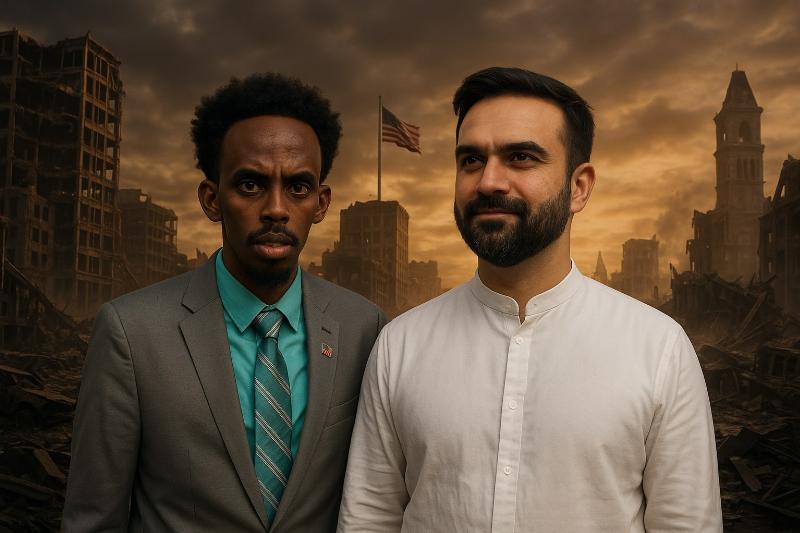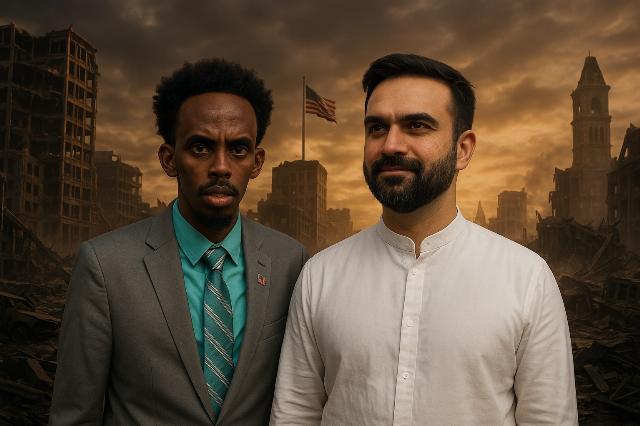


Many Americans are asking how we reached a point where lawlessness, anti-Americanism, and open sympathy for terrorists are not only tolerated but celebrated—and where mayoral candidates who would once have been considered “fringe” can win primaries in major cities. The answer? Since the 1960s, the United States has undergone one of the most dramatic political rebrandings in modern history, particularly on the Left. The sixties radicals never disappeared. Their ideas, once considered extreme, have not only resurfaced, they’ve been rebranded. Today, extremism is marketed to new generations as compassionate, inclusive, and enlightened, marching under the “progressive” banner and embraced by a growing bloc of post-9/11, college-educated voters.
However, while the rhetoric has softened, the underlying ideology and its mission remain unchanged. Indeed, the label “Progressive” is itself a branding triumph. It wraps radical demands in the soft language of European-style social democracy. But the resemblance is misleading. Unlike Europe’s Social Democratic parties, which operate comfortably within free market economies and reject Marxist class conflict, the American progressive left is anti- capitalist and embraces identity-based Marxism, recasting social conflict in terms of race, ethnicity, and gender. Today, that rebranding is no longer confined to universities or activist circles—it is shaping electoral outcomes. The rise is not an aberration, but the culmination of a movement decades in the making.
The Radical Roots
In the 1960s, radical groups like Students for a Democratic Society, the Weather Underground, and the Black Panthers openly called for dismantling America’s political and cultural framework. Their rhetoric—violent, confrontational, and contemptuous of American identity—alienated the public. The Left learned a crucial lesson: they could not win by storming the gates. To succeed, they would need to exchange the vocabulary of revolution for the language of compassion, justice, and human rights.
The Rebranding Campaign
Over decades, the Left refined its message. Words that once triggered alarm were replaced with language that sounded moral and inclusive. This was more than semantics—it reframed the debate over what America is and should be. Policies once seen as dangerous gained legitimacy by being rebranded as moral necessities. Over the next several decades, the radicals and their ideological heirs shifted the battleground from the streets to the lecture hall, the newsroom, the school board meeting and now to City Hall.
The rebrand affected all sectors of American life. In universities, student radicals, once viewed with suspicion by administrators as agitators, turned into “activists,” eventually becoming administrators and faculty themselves. Serving on Admissions Committees, they made “activism” the price of getting in. Radical theories like Derrick Bell’s Critical Race Theory might have sunk into obscurity and irrelevance, but rebranded by Bell’s intellectual heirs under the more palatable and corporate friendly banner of “Diversity, Equity and Inclusion” (DEI) it became, perhaps, the most successful academic- to- public transition of any modern ideological framework. Yet few outside the academy grasped that the new vocabulary did not carry traditional meanings. “Equity,” for example, did not refer to equality before the law or equality of opportunity, but to race-based preferences intended to correct for America’s “original sin.” The result was a moral and linguistic shift with profound consequences for hiring, education, and public policy.
The shift in vocabulary was even more pronounced in the realm of prisons and crime. Angela Davis, a self described communist, once championed prison abolition from the margins. Her radical call has today been transformed into “criminal justice reform.” In the process, entire categories of crime like shoplifting have been de-criminalized, decarceration has replaced incarceration, and calls to defund the police have grown. The violent black liberation movement of the Black Panthers which alienated many Americans was rebranded in 2016 as Black Lives Matter. BLM, while rooted in the same frustrations as the Black Panthers, adopted a softer, more media savvy approach using social media and protest art to gain support.
Once, the sanctity of a sovereign nation state was accepted by both parties, but the campaign for open borders has been reframed as a humanitarian necessity justified under “no human is illegal” while the term “illegal” was replaced in public forums as “undocumented.” Amnesty was rebranded as “a pathway to citizenship,” justified as a prerequisite for “ true” immigration reform. Rebranded under the rhetoric of compassion, Americans—especially the young—responded to the moral appeal.
Even foreign policy has been affected. Groups once universally condemned as terrorist organizations, like Hamas, have been rebranded in activist spaces as “resistance” movements, sheltering under the umbrella of Progressive intersectionality.
This rebranding is not cosmetic. It has reframed the very debate about what America is and should be. Generations have grown up hearing these ideas only through their softened vocabulary, never as the radical proposals they once were.
A New Voter Base
The post-9/11 generation—now approaching one-quarter of the electorate—is the first to have been fully shaped in this rebranded political climate. In classrooms and lecture halls, they’ve been told America is not a nation to admire but a system to repair or replace. Social media amplifies this worldview, rewarding ideological conformity and punishing dissent. In this environment, radical policies are embraced not for their practical outcomes, but as expressions of personal virtue. “Free” housing, “free” transportation, decarceration, and even sympathy for extremist causes are not viewed as reckless—they are considered moral imperatives. This is the cultural soil in which figures like Mamdani and Fateh thrive.
The Mamdani & Fateh Moment
Zohran Mamdani in New York and Omar Fateh in Minneapolis are not political outliers. Their platforms—government-run grocery stores, guaranteed housing and transportation as “human rights,” defunding police, mass decarceration, and open sympathy for extremist movements—would have been political suicide a generation ago. Today, they are winning primary elections. To their supporters, these policies are not radical but overdue acts of justice. Challenging the legitimacy of core American institutions is framed as a moral good. Their success is proof that rebranded radicalism has moved from cultural influence to direct political power. The revolution is no longer outside the gates.
The Stakes
What’s at risk is the definition of American citizenship itself. The new “social contract” abandons individual rights for state dependency, merit for identity politics, and the constitutional framework of limited government for a constantly shifting set of activist demands on government.
The change is incremental but profound. If these ideas continue unopposed, the transformation will be irreversible. The America our grandparents recognized will survive only in history books—and eventually, not even there.
Calling It What It Is
The rise of Mamdani and Fateh is the harvest of seeds planted more than half a century ago. The radicals of the 1960s learned they could not seize power by force, so they changed tactics: infiltrate, rebrand, normalize—and wait. The wait is over. The Post-9/11 generation has arrived. Whether or not Mamdani or Fateh win their respective elections is beside the point. They have shifted the window of what is acceptable, even admirable, in mainstream politics. Others will follow their lead—perhaps with more subtlety, but no less conviction.
We are now living in the age of the rebranded revolution. And unless it is named, challenged, and debated, it will continue to redefine America—not by storming the gates, but by changing the labels on them.
Author’s note: Dr. Kim Ezra Shienbaum, Emerita Professor of Politics, Rutgers-Camden.

Image generated by AI.
